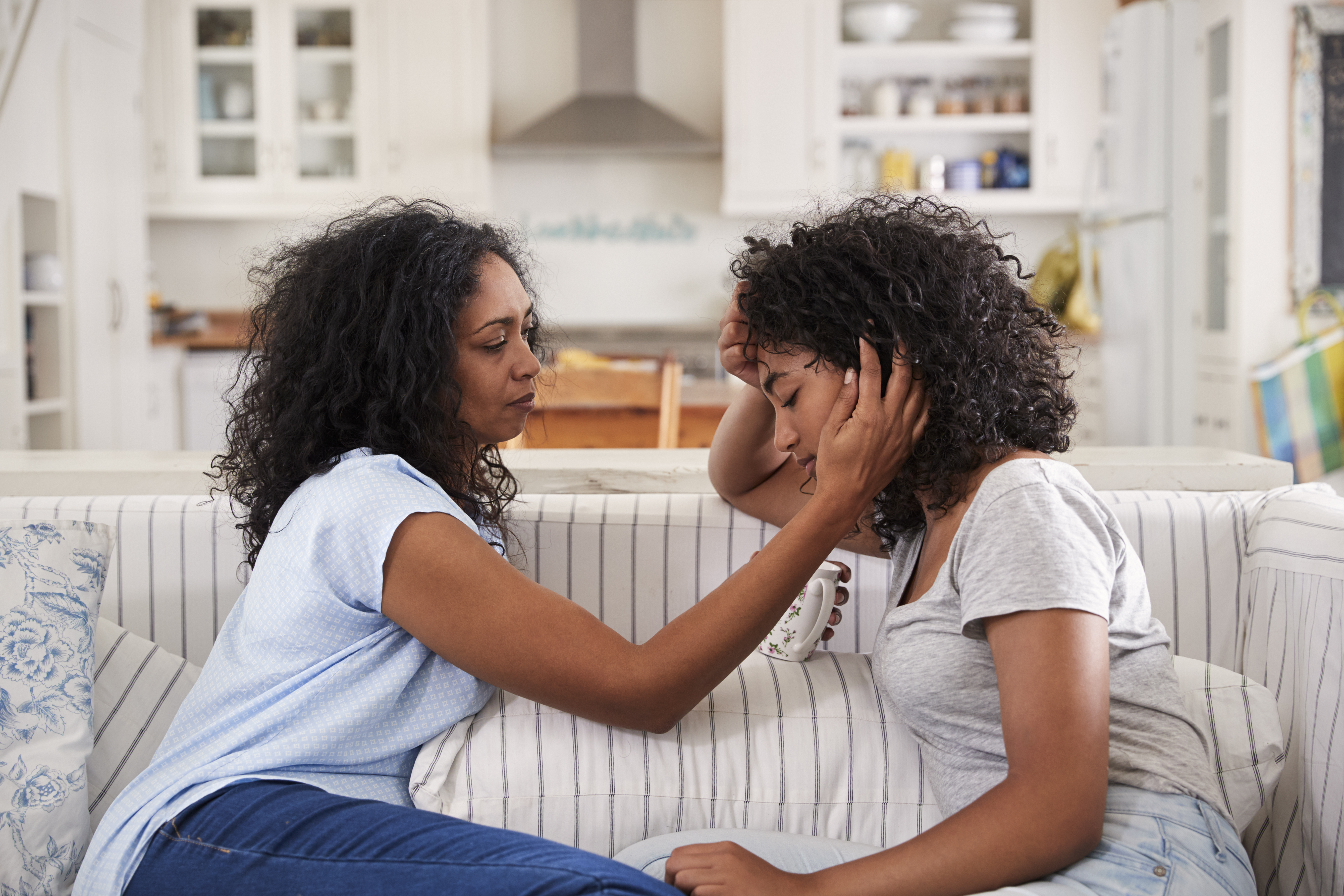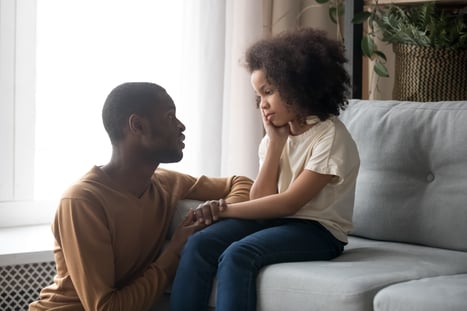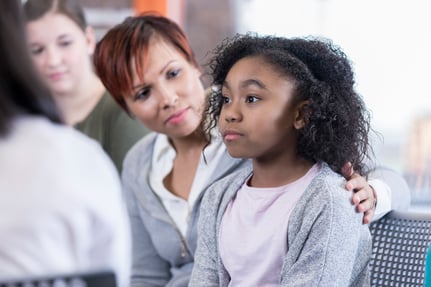Talking to Kids About Cancer
5 min read

How to Tell Your Kids About Your Cancer Diagnosis
While the cancer journey is riddled with potentially unpleasant moments, talking to kids about cancer is arguably one of the most emotionally-challenging demands cancer can place on a patient. In particular, telling your kids about your own cancer diagnosis can be so overwhelming, many parents don’t know where to start. Rocky Mountain Cancer Centers’ social workers provide suggestions for how to have conversations with your children – or grandchildren – about cancer and how to tell your kids about your cancer diagnosis.
Specific communication styles will differ depending on your child’s developmental stage and temperament. For this reason, many of these suggestions are purposefully general. For example, experts suggest telling your kids about your cancer diagnosis directly (as opposed to overhearing adults talking about it). With a 5-year-old child, you might want to say “Mommy has an illness that will take a lot of medicine and doctors to get rid of. And, I might feel sick a lot this winter.”
Whereas, with a 14-year-old teen, you may want to use adult-level vocabulary to explain your diagnosis and treatment. But, either way, the suggestion is the same: Your kids should find out about your cancer from you or another trusted adult, not through secondhand information.
Suggestions for Telling Your Kids About Cancer
-
- Tell kids directly (you or another trusted adult). Don’t let them find out by overhearing others’ conversations.
- Build trust with honesty. Be as straightforward and clear as possible. Avoid lying. It IS possible to be both honest and hopeful at the same time. For example: “I have cancer and we are doing everything we can to get rid of it.”
- Encourage your children to ask you questions and try to answer them honestly. Often, kids’ imaginations may make things worse than the reality. Also, don’t be surprised if they don’t have questions or are very quiet. Sometimes just letting them know it is okay to talk about cancer is enough and opens the door for further conversation in the future.
- Tailor language to the developmental stage and temperament of your child.
- You don’t have to cover everything at once. You may have many conversations before your child feels they have an understanding of the situation.
- Take time for self-care and be aware of your own emotional state before this conversation.
- Brainstorm their questions in advance. Like a job interview, it can be helpful to be prepared with some likely questions your kids might ask. Some people feel more confident going into a conversation with kids about cancer if they even practice answering the questions beforehand.
 Pick a good time. Be deliberate about when you start the conversation. Like many things, telling your kids about your cancer diagnosis when they are tired or hungry might make the conversation even harder. Try to find a time when there are few distractions, you’re not in a rush, and your child is rested and well-fed.
Pick a good time. Be deliberate about when you start the conversation. Like many things, telling your kids about your cancer diagnosis when they are tired or hungry might make the conversation even harder. Try to find a time when there are few distractions, you’re not in a rush, and your child is rested and well-fed. - You don’t have to know all the answers. You can talk about your cancer with your child/ren and not have all the answers. It is okay to tell your kids: “That is a great question. I don’t have the answer to your question, and if I find out the answer, I will be sure to let you know.”
- Ask a child what they know or have heard about cancer. If they already have an accurate understanding of the disease, you don’t have to spend time defining it. Alternatively, they may have incorrect assumptions or have heard things from other sources that need to be corrected.
- Use the correct word choice:
- RMCC’s social workers recommend using the word “cancer” instead of “illness.” Sometimes kids might think cancer is like a cold and something you can catch and lump it into their understanding of other illnesses they’re familiar with. So, using the term “cancer” can help clarify for your child that it is not like a cold or stomach flu. You also can’t get cancer from not washing your hands, etc.
- Use the word “chemotherapy” to identify this is a specific medicine and is not like cough syrup or Tylenol. Explain that it is working to get rid of the cancer, but can sometimes make mom (or dad or grandpa/grandma) feel worse as it does its job. Distinguishing that chemotherapy doesn’t always work like medicines they’re familiar with and cause immediate improvement is important. In fact, sometimes it makes you feel worse as it works to get rid of the cancer.
Common Questions Kids Have About Cancer
Here are some common questions kids often have about cancer.
- How did you catch cancer? Will I catch it?
- What is cancer?
- Will you be okay? Do people die from cancer?
- How come you’re not feeling better if you’re taking medicine for your cancer?
How Can I Support My Kids Through My Cancer?
- Stick to routines and normal household rules.
- Find opportunities for children to follow their own interests and have fun during your illness and treatment. You may not be able to physically provide these, but line up others to do it.
- Make sure your children feel (and are) cared for. Identify other adults in their lives who they can lean on. Remind your children: “You will always be taken care of.”
- Encourage sharing feelings and validate them. This is a healthier way of processing big emotions than avoiding them, and it can reduce anxiety.
 The final, and possibly most important, suggestion about talking to kids about cancer is to reach out to your support network. Surprisingly, this will help both you and your children during a very difficult time. Emotional support can come from shared or private conversations for you and your kids and can include: support groups (both online and in-person), your RMCC social worker, trusted adults your kids can turn to, or your own personal therapist. To read one cancer patient’s personal story about talking to her kids about cancer, read our cancer education blog.
The final, and possibly most important, suggestion about talking to kids about cancer is to reach out to your support network. Surprisingly, this will help both you and your children during a very difficult time. Emotional support can come from shared or private conversations for you and your kids and can include: support groups (both online and in-person), your RMCC social worker, trusted adults your kids can turn to, or your own personal therapist. To read one cancer patient’s personal story about talking to her kids about cancer, read our cancer education blog.
RMCC works to provide emotional support for both the cancer patient and the entire family. Find out more about our resources for cancer caregivers.